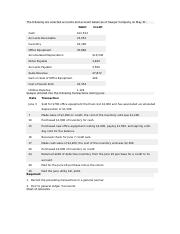From minor transactions to large payments, it’s important to make sure that everything is recorded and properly categorized in your accounts. The main
From minor transactions to large payments, it’s important to make sure that everything is recorded and properly categorized in your accounts. The main reason to reconcile accounts is to ensure the accuracy and validity of financial information. When you reconcile transactions, any discrepancies that have occurred during the reporting become clear, giving you an exact picture of your finances. It’s especially important because 82% of businesses fail due to poor cash flow management, and reconciliation helps to tackle this issue at the very core. Even a small accounting error can lead to big problems for your company. If you run a trial balance that’s not accurate, the effects of a single error or omission on an accounting entry can ripple out to every area of your company.
- Accounting errors are usually unintentional mistakes made when recording journal entries.
- Such a comparison will assist in finding errors that didn’t get written down correctly.
- It’s a simple error but it completely throws off your accounting.
- An error of commission occurs when an amount is entered right and in the correct account but the value is wrong–i.e.
- These errors can be costly and can cause significant damage to a company of any size.
- Misplacing a receipt or invoice so that it never gets recorded is one example of an error of omission.
Because your audit trail details all of the information about transactions, you can use it to cross-check the information you recorded in your books. In summary, the most common accounting mistakes are mostly connected to human error and skipping certain bookkeeping practices. Many businesses are terrified of the word “reconciliation” usually because it’s time-consuming, error-prone when done manually, and without proper software can be quite complex. However, it’s very important for a business to frequently reconcile the accounts to catch accounting errors early. If you’re using a double-entry method of bookkeeping, having a general ledger with entries being recorded both as credit and as debit also lets you avoid errors. And if you think double-entry means double work, don’t worry, an accounting program will do all that work for you.
Utilize the newest accounting software
When this happens, it’s visibly clear which accounts don’t match. All you have to do is scan the document and make a correcting entry. If you’re on the hunt to find accounting errors in your books, seek help from your audit trail.

Too many incidents like this may create distrust in your accounting system. In fact, a survey by QuickBooks showed that 1 in 6 small business employees said a single inaccurate paycheck would make them quit their job. GAAP (Generally Accepted Accounting Principles) are the accounting rules you are obligated to follow when making financial statements. When running your own business’ finances, you’ll likely make accounting errors from time to time.
Not reconciling loan accounts
When an entry is debited instead of being credited, or vice versa, this is an error of reversal. When two digits are reversed (or “transposed”), an error is created in the books. It’s a simple error but it completely throws off your accounting. When utilizing any accounting system, it’s important that you train your employees on how to use it properly and take advantage of the advanced features it has to offer. Someone going unpaid will probably result in an angry employee phone call, but finding the error before payroll gets completed should be your main goal. Comparing the current payroll to the last pay period for any large swings up or down should be your first move, especially if your employees have consistent schedules week over week.
What are the 4 types of errors in accounting?
What are the 4 types of accounting errors? Most accounting errors can be classified as data entry errors, errors of commission, errors of omission and errors in principle.
These primary books provide a good way to check transactions and their amounts to find any potential errors. Though checking for errors this way might prove tedious in the long run, reviewing all transactions for possible errors provides a holistic overview of the accounts. Errors in accounting happen, sometimes inadvertently and sometimes through a lack of understanding of accounting principles. Either way, the information you get from your accounting system is only as good as the data you enter.
What are the most common types of accounting errors & how do they occur?
Understanding how common accounting errors arise and where to look for them are important first steps. Using automated integrated software, together with an assortment of preventive and detective Types of Errors in Accounting: A Guide for Small Businesses controls, can create a less error-prone accounting environment. If you make an error of duplication, it will likely be recording a debit or a credit twice in the bookkeeping process.
- Download our FREE guide, Preventing Small Business Accounting Mistakes, to find out the top 10 accounting blunders to watch out for (plus how to fix them if you make a mistake).
- Whether it’s hiring employees, getting new accounting software, or relocating, business owners want to make sure that whatever they do contributes to more stability in profits.
- According to a report from IBM, an estimated yearly cost of poor-quality data in the US is $3.1 trillion.
- Error prevention may be a loftier, even impractical, objective given the human element involved, though the right accounting software controls can help.
- Changes to a closed accounting period can throw off your financial statements, causing you to make business decisions based on faulty information.
One example might be an incorrect entry in the inventory account and a corresponding entry in accounts payable and both are wrong. Compensating errors do not affect the trial balance since they are equal and opposite—and also incorrect. Not recording data is common, whether it’s not reporting expenses or not adjusting inventory quantities. https://accounting-services.net/student-bank-accounts/ Omitting data affects the balance sheet and can make a company look like it’s doing better than it actually is. It also creates problems when filing your small business taxes. Entry reversal resembles that of a principle error and can easily be confused for one, however, entry reversal is the result of entering data in the wrong direction.


